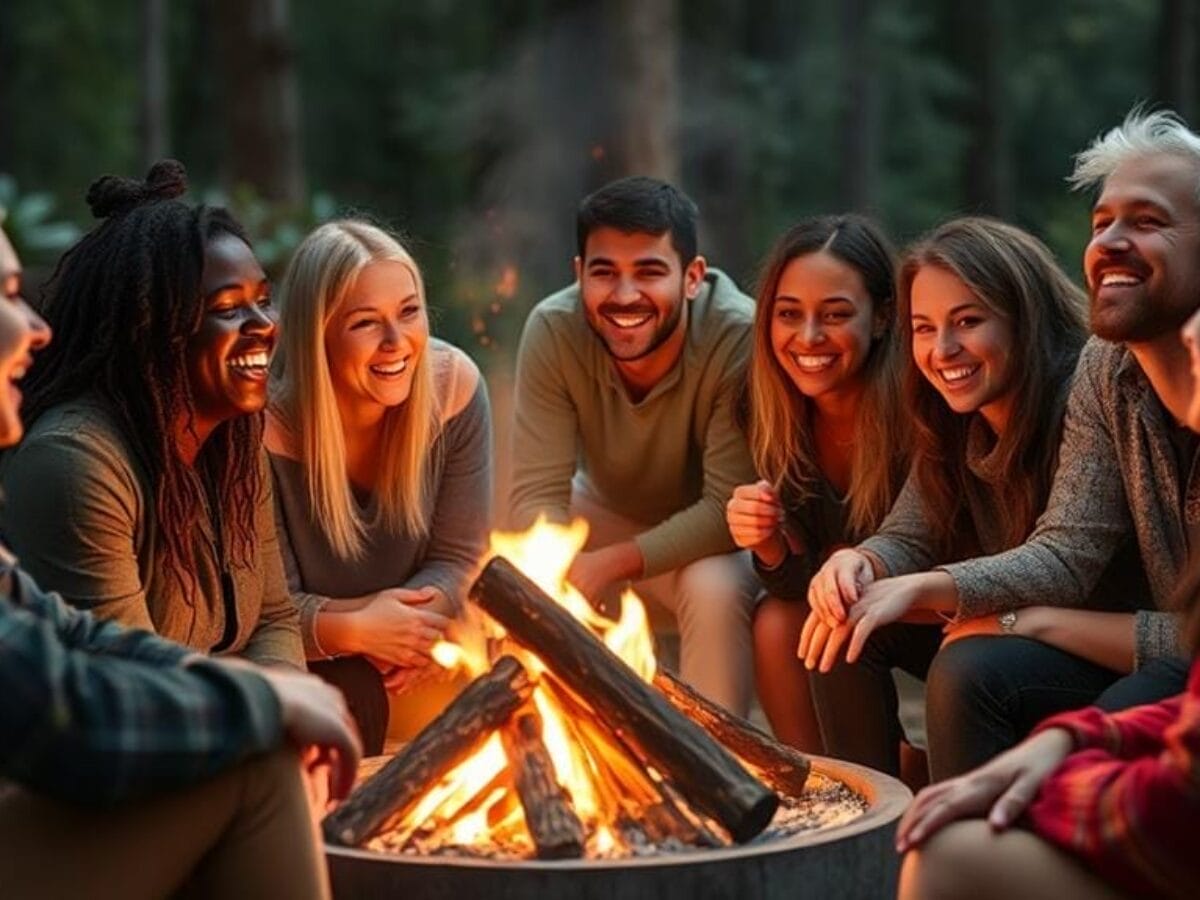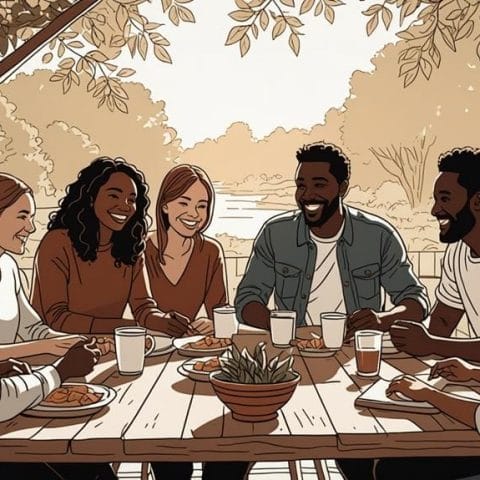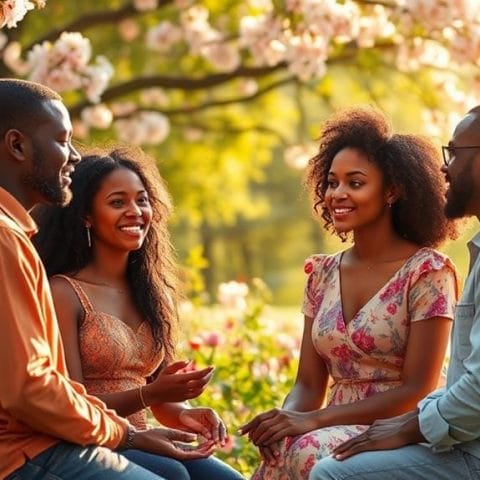Strengthening your interpersonal relationships and friendships is essential for emotional well-being and support. It begins with effective communication; maintain eye contact and ask open-ended questions to encourage deeper conversations. Active listening plays a vital role, creating an environment where individuals feel valued and understood. Engage in shared activities to build lasting memories and strengthen connections. Regular check-ins show you care, while open communication fosters trust and honesty. Celebrate milestones together and turn conflicts into learning opportunities. By nurturing these aspects, you'll discover meaningful connections that enrich your life—stay tuned to explore more strategies for building incredible relationships!
Key Takeaway
- Cultivate trust by being open and honest, fostering a safe environment for sharing thoughts and feelings.
- Engage in active listening, which shows individuals they are valued and promotes deeper connections.
- Participate in shared activities or interests to create lasting memories and strengthen bonds.
- Maintain regular check-ins to demonstrate care and show that the relationship matters to you.
- Use open-ended questions to encourage deeper conversations and invite personal insights from others.
Importance of Building Connections

Building connections is essential for fostering healthy relationships in both personal and professional spheres. When you prioritize building these connections, you create a strong foundation for emotional support that can lift you and those around you. Think about how much better you feel when you have someone you can lean on during tough times. Trust building is a big part of this process, as it allows individuals to feel safe and secure sharing their thoughts and feelings.
By investing time in forming these connections, you're not just creating friendships; you're also establishing a network of allies who can back you up when challenges arise. Whether it's a colleague who covers for you at work or a friend who listens without judgment, these relationships greatly enhance your well-being. You don't want to underestimate the power of a simple conversation or a genuine smile. These small gestures cultivate compassion and encourage open communication.
Moreover, emotional support from trusted connections can lead to positive mental health outcomes. When you know someone has your back, maneuvering through life's ups and downs becomes a little easier. You'll find that shared experiences build trust, strengthening your bonds even further. So, don't hesitate to reach out! Make an effort to connect on a deeper level with those around you. Every connection you build is a step toward a more supportive and fulfilling life, creating a circle where safety and trust thrive. Embrace the journey of connection, and you'll discover the rewards are endless!
Effective Communication Techniques

When you engage in a conversation, effective communication techniques can make all the difference. The way you express yourself shapes not just the outcome of discussions, but the quality of your relationships. One essential aspect is recognizing body language cues. These non-verbal signals often carry more weight than words themselves. For instance, maintaining eye contact shows attentiveness, while crossed arms might signal defensiveness. Pay attention to these cues in yourself and others to create a welcoming atmosphere.
Another important technique is effective questioning. Questions not only help you gather information but also show your interest in the other person's thoughts and feelings. Instead of asking yes or no questions, try open-ended ones. For example, instead of, "Did you enjoy the event?" ask, "What did you like most about the event?" This approach invites deeper conversation and fosters connection.
The Role of Active Listening

Effective communication isn't just about how you talk; it also relies heavily on how well you listen. Active listening plays a pivotal role in strengthening your interpersonal relationships and friendships. When you truly engage in a conversation, you create a comforting atmosphere where the other person feels valued and safe. This sense of safety encourages open dialogue and deeper emotional empathy.
You can show you're actively listening by paying attention not just to the words being spoken but also to nonverbal cues. These cues may include body language, facial expressions, and eye contact. Putting down your phone or turning your body toward the speaker sends a clear message: "I'm here for you." This simple act can profoundly impact how connected you feel.
By practicing active listening, you allow others to express their thoughts and feelings without fear of judgment. It shows you care about their perspective, fostering trust and understanding. Remember, responding thoughtfully—even with just a nod or a smile—can validate their feelings and encourage further sharing.
It's all about being present in the moment. So, next time you're in a conversation, take a deep breath, relax, and immerse yourself in what your companion is saying. You'll likely find that both of you emerge feeling more understood and appreciated, which makes for a richer, more rewarding interaction. And who wouldn't want that? Your relationships deserve that kind of effort and attention!
Shared Experiences and Activities

Shared experiences and activities can greatly deepen your connections with others. Engaging in bonding activities creates lasting memories that strengthen relationships. Whether it's a weekend hike, a cooking class, or a game night, these experiences offer opportunities to share joy, laughter, and sometimes even a little chaos. You know those times when you're both struggling to follow a recipe and end up making a hilarious mess? That's what makes the adventure memorable!
Think about how a day spent together can transform a simple friendship into something more substantial. Participating in activities allows you to discover shared interests, encouraging deeper conversations and understanding. Plus, it's a great way to support each other through challenges—like tackling a rock climbing wall or learning to dance. Every new experience builds trust and strengthens that unspoken bond.
Memorable adventures don't have to be grand or extravagant. Even a stroll through the park, a movie marathon, or volunteering for a local charity can create meaningful moments. The key is to be present and open to whatever the day brings.
Nurturing Long-Term Friendships

Nurturing long-term friendships requires consistent effort and genuine care. It's not just about being there during good times; it's about building a foundation of trust and developing skills for conflict resolution. Cultivate these strong ties by keeping the following in mind:
- Regular check-ins: A simple text or call to say you're thinking of them can mean the world.
- Shared goals: Whether it's planning a trip or supporting each other's fitness journeys, having common aspirations strengthens your bond.
- Open communication: Be honest about your feelings and encourage your friend to do the same. This transparency fosters trust building.
- Celebrate milestones: Acknowledge birthdays and accomplishments—big or small. This shows your friend they matter in your life.
Over time, conflicts may arise, but approach them with a calm demeanor. Remember, every relationship has ups and downs. Engaging in constructive dialogue can turn potential misunderstandings into opportunities for deeper connection.
When you take the time to actively listen and empathize, you create a safe space for your friendship to flourish. Encourage each other to grow and adapt, embracing change instead of resisting it.
In nurturing your friendship, you both lay down roots of trust that can weather life's storms. So go ahead, invest in the relationships that bring you joy, laughter, and that comforting feeling of belonging. Your future self will thank you for the love and support you cultivate now!
Frequently Asked Questions
How Can I Rekindle a Friendship After a Long Absence?
To rekindle a friendship after a long absence, try reaching out with reconnecting strategies like texting or calling. Share meaningful conversations that reflect on memories, showing genuine interest in their life and feelings.
What Are Some Red Flags in Unhealthy Relationships?
In unhealthy relationships, watch for toxic behaviors like emotional manipulation and controlling tendencies. A lack of respect, constant criticism, and poor communication can signal danger. Prioritize your safety and trust your instincts when recognizing these red flags.
How Do I Set Boundaries With Friends?
Did you know 70% of people feel overwhelmed by their friends' expectations? To set boundaries, practice clear boundary communication. Discuss your friendship expectations openly, ensuring you both feel safe and respected in your relationship.
Can Social Media Negatively Impact Friendships?
Yes, social media can negatively impact friendships. It often leads to friendship comparison, creating unrealistic expectations. You might feel inadequate or disconnected, so it's crucial to limit exposure and focus on genuine connections instead.
What Are Ways to Deal With Conflict in Friendships?
When you argue with a close friend over differing opinions, use communication strategies like active listening and "I" messages. This fosters understanding and aids conflict resolution, helping you both find common ground and restore harmony.
Conclusion
In a world bursting with distractions, nurturing your interpersonal relationships is like adding rocket fuel to your life's happiness! By embracing effective communication, active listening, and shared experiences, you'll not only strengthen friendships but also create unforgettable memories. So, jump in, invest time, and watch your connections flourish like flowers in spring! Remember, these bonds are essential; they can turn ordinary moments into extraordinary adventures. Don't wait—start building those lasting friendships today!








